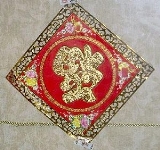
Fu character
Encyclopedia
Mounted Fú Characters are a widespread Chinese
tradition associated with Chinese New Year
that can be seen on the entrances of many Chinese homes worldwide. The characters are generally printed on a square piece of paper or stitched in fabric, and are posted upside-down on the front door of a home. The term fú 福 means "blessings" or "happiness", and the practice is traditionally believed to invite prosperity and peace to the dwelling. The practice is universal among Chinese people regardless of socioeconomic status
, and dates to at least the Song Dynasty
(AD 960
- 1279).
 The essentially universal practice of posting the fu character upside-down has several different traditional explanations. The most basic of these is based on a wordplay
The essentially universal practice of posting the fu character upside-down has several different traditional explanations. The most basic of these is based on a wordplay
: in nearly all varieties of Chinese
, the words for "upside-down" and "to arrive" are homophonous
or nearly homophonous. Therefore, the phrase "Fu upside-down" sounds either identical or nearly identical to the phrase "Fu arrives". The practice of orienting the character upside-down is thus viewed as a natural wish for prosperity to descend upon a dwelling.
Another traditional story states that posting the character upside-down originates with the family of a 19th-century prince of the Qing Dynasty
. The story states that on one Chinese New Year's Eve (or Chuxi), the prince's servants played a practical joke by pasting fu characters throughout his royal dwelling. One illiterate servant inadvertently placed the characters upside-down. The prince was said to have been furious upon seeing the characters, but a quick-thinking servant humbly calmed the prince by saying that the occurrence must have been a sign of prosperity "arriving" upon his household by using the above wordplay.
Han Chinese
Han Chinese are an ethnic group native to China and are the largest single ethnic group in the world.Han Chinese constitute about 92% of the population of the People's Republic of China , 98% of the population of the Republic of China , 78% of the population of Singapore, and about 20% of the...
tradition associated with Chinese New Year
Chinese New Year
Chinese New Year – often called Chinese Lunar New Year although it actually is lunisolar – is the most important of the traditional Chinese holidays. It is an all East and South-East-Asia celebration...
that can be seen on the entrances of many Chinese homes worldwide. The characters are generally printed on a square piece of paper or stitched in fabric, and are posted upside-down on the front door of a home. The term fú 福 means "blessings" or "happiness", and the practice is traditionally believed to invite prosperity and peace to the dwelling. The practice is universal among Chinese people regardless of socioeconomic status
Socioeconomic status
Socioeconomic status is an economic and sociological combined total measure of a person's work experience and of an individual's or family’s economic and social position in relation to others, based on income, education, and occupation...
, and dates to at least the Song Dynasty
Song Dynasty
The Song Dynasty was a ruling dynasty in China between 960 and 1279; it succeeded the Five Dynasties and Ten Kingdoms Period, and was followed by the Yuan Dynasty. It was the first government in world history to issue banknotes or paper money, and the first Chinese government to establish a...
(AD 960
960
Year 960 was a leap year starting on Sunday of the Julian calendar.- Europe :* Edgar the Peaceable is crowned King of England. Dunstan becomes Archbishop of Canterbury and Edgar's chief adviser. He reforms monasteries and enforces the rule of Saint Benedict: Poverty, Chastity and Obedience for...
- 1279).
Traditions

Wordplay
Wordplay is a musician/actor, of mixed British and Black African descent. Gaining worldwide exposure as an actor in 1998 through the Austrian Obscuro Gothic science fiction film "Dandy dust" directed by Hans Schierl...
: in nearly all varieties of Chinese
Varieties of Chinese
Chinese comprises many regional language varieties sometimes grouped together as the Chinese dialects, the primary ones being Mandarin, Wu, Cantonese, and Min. These are not mutually intelligible, and even many of the regional varieties are themselves composed of a number of...
, the words for "upside-down" and "to arrive" are homophonous
Homophone
A homophone is a word that is pronounced the same as another word but differs in meaning. The words may be spelled the same, such as rose and rose , or differently, such as carat, caret, and carrot, or to, two, and too. Homophones that are spelled the same are also both homographs and homonyms...
or nearly homophonous. Therefore, the phrase "Fu upside-down" sounds either identical or nearly identical to the phrase "Fu arrives". The practice of orienting the character upside-down is thus viewed as a natural wish for prosperity to descend upon a dwelling.
Another traditional story states that posting the character upside-down originates with the family of a 19th-century prince of the Qing Dynasty
Qing Dynasty
The Qing Dynasty was the last dynasty of China, ruling from 1644 to 1912 with a brief, abortive restoration in 1917. It was preceded by the Ming Dynasty and followed by the Republic of China....
. The story states that on one Chinese New Year's Eve (or Chuxi), the prince's servants played a practical joke by pasting fu characters throughout his royal dwelling. One illiterate servant inadvertently placed the characters upside-down. The prince was said to have been furious upon seeing the characters, but a quick-thinking servant humbly calmed the prince by saying that the occurrence must have been a sign of prosperity "arriving" upon his household by using the above wordplay.

